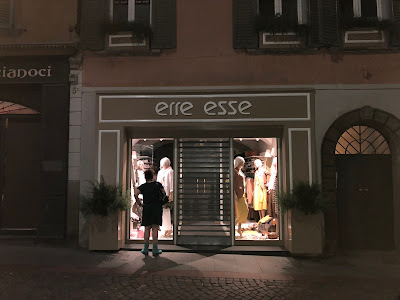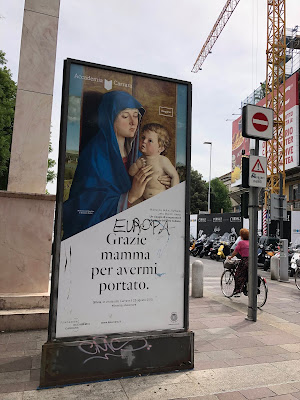previous lesson | this lesson | next lesson
We’re back in Italy! And everyone here has told me three things
loud and clear: I’m heavier, I’ve gotten grayer, and I’ve forgotten my Italian.
I love these Italians, they are so honest! Heavier, yes. Four months in the USA equals 10 pounds added. Grayer?
Maybe, but could just be that I arrived with longer hair and it seemed grayer.
Forgotten my Italian? Well those dirty dogs. I don’t need them. The sound of
church bells, the scents of tilia
(lime trees) and false jasmine,
and gelato shops on every corner are enough welcome back for me.
As to language, day one back in Bergamo I
started noticing signs and taking notes. Therefore, let’s pick up where we left
off with Street Sign Language Lesson™. In
this episode we learn about the Italian alphabet, male fruit trees and their female fruit, and rail against KFC. Let's begin.



Left: A shop called Erre Esse or RS. Center: A shop for plus size clothes, Taglie Forti. Right: Verderosa Gelaterie announcing the arrival of cherries.
Erre esse – R
S.
I’ve stared at this shop sign many times,
but tonight as we were passing, I realized it’s just the letter R (erre)
and S (esse). A big head slap.
While speaking about the letters of the Italian alphabet (alfabeto), remember that there are 21 "official" letters with 5 “foreign” ones added to make a total of 26 letters, the
same as the English alphabet. The 5 added letters are j, k, w, x, and y.
Taglie forti – Plus sizes.
And another shop sign that stumped me for two years. I
thought it meant cool styles, or literally strong styles. As we passed by the
other day in Santa Caterina I finally looked it up. The phrase translates to plus sizes. Una taglia
is a size, pluralized as taglie. Forte
is an adjective that pluralizes as forti
regardless of gender. Together, they make the phrase taglie forti. (Speaking of putting on weight.)
Le ciliegie
sono tornate. Gustale come non le hai mai provate solo da Verderosa. – The cherries are back. Taste them as you never have
only at Verderosa.
Gelateria
Verderosa is the best gelato shop in Bergamo, in our opinion. Gustale
is a command built from the verb gustare
– to taste – and its informal imperative form gusta with the article le
referring to the plural, feminine cherries.
Now is a good time to take a slight detour and talk about
fruit trees and their fruit. Many fruit trees are masculine in gender and the fruit feminine. I bring
this up because cherry and cherries fall into this category. Here's a partial list of trees and fruits where this is true:
tree (fruit): l’albicocco (l’albicocca), l’amareno
(l’amarena), l’arancio (l’arancia), il banano (la banana), il corbezzolo (la
corbezzola), il carrubo (la carruba), il castagno (la castagna), il ciliegio (la ciliegia), il cotogno
(la cotogna), il giuggiolo (la giuggiola), il mandorlo (la mandorla), il melo
(la mela), il melograno (la melagrana), il nespolo (la nespola), il noce (la
noce), il nocciolo (la nocciola), l’olivo (l’oliva), il pero (la pera), il
pesco (la pesca), il susino (la susina)
Be aware of the biggest exception il fico – fig tree – with its fruit il fico and not la fica,
which means pussy. Also, almost all citrus trees and fruits uses the same word,
for example, il limone to refer to
both the tree and the fruit. L’arancio/l’arancia
is the only exception. Darn these exceptions!
La fica or la figa (depending on where you are in Italy) are
vulgar terms. However, they are also very close to a number of ways to say “cool”. The web site Una
finestra sull’Italia does a nice job of summarizing these terms.



Left: Croce dei Morti warning: we were like you, you will be like us. Center: Reminder to validate parking. Right: A comment of immigration in Europe?
Voi viandanti
che passate inchinatevi a noi. Eravamo come voi sarete come noi. - You wayfarers that pass, kneel
before us. We were like you, you’ll be like us.
We saw this little shrine at a spot just outside of Bergamo
called Croce dei Morti (location on
OpenStreetMap). It’s easy to get their by car, bike, or on foot (see this post
for how to hike there from Bergamo). The temple was constructed in 1930 in memory of the 1630
plague (reference). The part that reads Eravamo come voi sarete come noi – uses imperfect (eravamo) and the future (sarete) of the verb to be. You can also
find this saying using the distant past tense of passato
remoto, which yields Fummo come voi
sarete come noi.
Ricordarsi di
far vidimare il biglietto del parcheggio alle casse. – Remember
to validate your parking ticket with the cashier.
I was curious about this sign because I’d never seen the verb
vidimare, which means
to endorse or approve. Far vidimare is
to get endorsed or approved. In English, validate is closest to the intended
meaning. This sign was sign at the supermarket Esselunga on Via Corridoni.
Looping back to the first sign we talked about in the post, Erre Esse, I will mention that it took
me several years to realize that Esselunga meant literally “long -s” as is
completely obvious in their logo. Another head slap.
Europa - Grazie mamma per avermi portato. – Europe – Thank you mom for having brought me.
Grazie mamma per avermi portato was a slogan used by the Accademia Carrara around the city to – I’m guessing – encourage parents to take their kids to the museum because their kids would thank them for doing that. The image used in the publicity is Giovanni Bellini’s “Madonna col Bambino” and also called the “Madonna di Alzano”, painted around 1485 and which is in the Carrara’s collection.
With all the recent news about refugees in Italy and the general crisis in Europe as to what to do with refugees, the scrawled “Europa” added to this advertisement gives it a whole new meaning.



Left: Damn KFC and their irresistible chicken. Center and Right: More bad dog owner behavior in Bergamo.
L’irresistibile
pollo fritto ti aspetta. – The irresistible fried chicken
is waiting for you.
We saw this ad on scaffolding shortly after arriving. I was
taken aback by how out of place KFC food looks here in Italy. Go home
KFC. You made me fat in the USA and now you’ve followed me here. Don’t
you know that the letter -k is not even really in the Italian alphabet?
Per favore, non fate fare la pipì ai vostri cani nelle piante. Muoiono. Un po’ d’educazione. Grazie. – Please don’t have your dog pee on the plants. They die. Some manners. Thanks.
What Street Sign Language Lesson would be complete without bad dog (owner) behavior? This one was seen on Via Pignolo, just a little north of Piazzetta Santo Spirito. Mouiono is third-person plural of the verb to die, morire.
No comments:
Post a Comment
All comments are moderated. If your comment doesn't appear right away, it was likely accepted. Check back in a day if you asked a question.